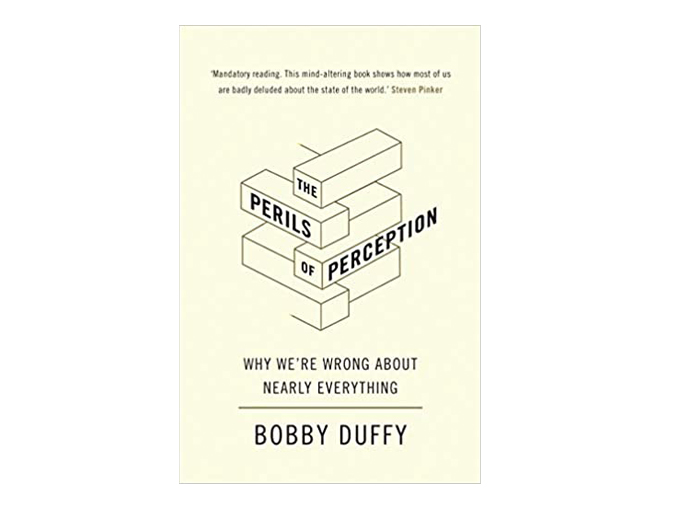Perils of Perception: Why We’re Wrong about Nearly Everything by Bobby Duffy, Publica, 2019 (Romanian edition, which this review is based upon), Atlantic Books, 2018 (English edition)
Perils of Perception: Why We’re Wrong about Nearly Everything by Bobby Duffy is an enlightening account of how hard it is to be accurate in the information overload world, where we are equipped with an imperfect rational compass and rather unstable emotional advisor.
Duffy was, until recently, global director of the Ipsos Social Research Institute, where the Perils of Perception is an Ipsos-run global research program measuring the distance between perception and key social realities across a range of topics from politics to climate change to personal issues. In the preface of the Romanian edition, Ipsos Romania Country Manager Alina Stepan reveals that the Ipsos global conferences offered a consolation prize to the manager of the country that had proven most “ignorant,” where the biggest gap between reality and perception had been measured.
I had two main takeaways from Perils of Perception. First, it was surprising how truly erroneous we are about the world we live in. Some of my own beliefs were seriously shaken. (If you want a tiny taste of the power of perception, I invite you to take part in a small experiment, proposed by the author in the beginning of the book. True or false: is the Great Wall of China visible from space? Just decide upon your answer fast and read along, we’ll get back to this.)
You may not realize the true magnitude of our misrepresentations until you see the data. The book is based on a consistent data set. Pages are filled with graphs showing perception and reality side by side revealing how people around the globe are so wrong about issues such as vaccination rates, causes of death, the number of immigrants in their country, sex lives of young people, to name a few. Not only that, but as the same data are available for dozens of countries, it enables exploration of the cultural differences in perception (e.g., Why do people in India drastically overestimate the obesity issue, while Americans drastically underestimate it?).
The second takeaway is the whys of being so wrong. Perils of Perception has behavioral science insights and psychological experiments galore, without providing one single “fits-all” explanation. The effects of the media and political discourse are also considered as the basis of our misrepresentations of the world. Different explanations apply to different topics.
Going back to the Great Wall of China question, if your answer was “yes, it is visible from space,” then you are wrong. Why did you end up believing it was visible? First, you never had the actual facts. You probably never searched for the actual data of length and width, etc. Second, you probably heard before, from somewhere, possibly several sources that yes, it is visible from space (and never heard a rebuttal). Third, you provided a fast answer, based on a mental shortcut/System 1 processing of information: it is common knowledge that the wall is big (the biggest structure built by man, actually), so your brain simply decided it is, just as well, visible from space. The list of explanations goes on and I will let you discover the rest in the book, but I think this is a nice preview of the complex system of explanations Bobby Duffy proposes.
Given the scientific weight of all the experiments and theories the book proposes, it is surprisingly easy to read, unless you are like me, and you need to write down aha! ideas in order to make sure you remember them. Then you will have to interrupt the reading process a lot.
There is a humorous and lighthearted approach to even the most profoundly scientific analysis. The author moves almost seamlessly between topics, from explaining how sugar ended up being the most recent food pariah to telling the story of an aliens-seeking cult, teen pregnancies, or dramatic tales of immigration and death.
Perils of Perception is a good reminder that things are rarely as they seem, and that we should constantly double-check our own perceptions of the world. It also provides a reliable, scientific, and complex framework to better understand the people at the core of our profession.


Be the first to comment